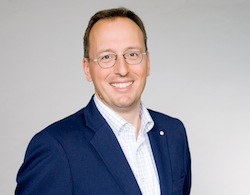“Wrong time, wrong place” is Gunther Ottendorfer’s sanguine assessment of the nature of his departure after leading Telekom Austria Group’s technology strategy.
The Group CTO is set to leave the operator next week, after the shock announcement of his exit came in the wake of Mobile World Congress.
Ottendorfer had hosted a press and analyst dinner at the event in Barcelona, so the news came as a surprise to many. Speaking to Mobile Europe, he says discussions about his future had been ongoing for some time. He explains: “We have been discussing the situation but there was the final decision on that day [6 March]. We had discussed scenarios before. I laid down what I requested for staying and they told me that couldn’t be done. That’s when I told them it was better to leave.”
The crux was whether Ottendorfer would continue in his role as a board member. Given Telekom Austria’s ownership, majority shareholder America Movil has control over who can hold the CFO and COO roles. The Latin American telco wanted its own person in the COO role, who would oversee the technology strategy. This was Alejandro Plater, a former Ericsson executive. It is unclear whether the CTO role will be shelved as Plater takes control of the technology strategy, as part of a wider brief.
Ottendorfer is measured about his impending departure, frequently stressing how fond he was of his time at Telekom Austria and how the operator had tried to make him stay. But he adds: “I came for an interesting job in a board position so I felt it was the best thing for me. It was unfortunate and I’m sad. I’ve liked very much to work here. They wanted me to stay but it was a case of ‘wrong time, wrong place’.”
During the past few weeks, Ottendorfer has been touring Telekom Austria Group’s various markets with Plater. He describes the Argentine as “very experienced in the telecoms business” and a good pair of hands to continue his work.
There had been fears Telekom Austria’s virtualisation heavy strategy could be changed under new leadership. Does Ottendorfer fear his work could be swept to one side? “Of course there will be an assessment going forward, that’s normal. But you would have to ask Alejandro. With NFV…there could be a change in timing and focus but that’s to be expected.”
He accepts that an issue with virtualisation is one of time, given how operators are seeking to transform their networks. “It’s fair to say it’s made for long term rewards…As a company we will need a bit longer to gain the benefits.”
He says the ability to bring services to market quicker is one potential reward for the short-term. He adds ePC, VoLTE and IMS have had the most encouraging results in Telekom Austria Group’s recent trials.
Ottendorfer says his immediate plans are reflection, possibly on a mountain bike saddle with an upcoming trip across the Alps planned. He is open about his future plans, joking that seeing he was known as “chief nerd” at TAG, he is open to joining start-ups or returning to his computer science background.
He is confident about the telco industry’s future, expecting the wave of consolidation sweeping Europe to continue. However, he says he feels virtualisation may open the industry up to more businesses. “There are opportunities for smaller vendors and service companies coming in. There will be a lot of virtualisation but not all of it will be served by big companies.”
He says recent customer-centric developments like TAG’s LTE smart meter are where operators can benefit. “Operators have a really good foundation and if they use those tools like faster time to market and their reach, there’s a great world of opportunity. The operators have the customer relationships already. The new players need to create the new customer relationships so there should be an advantage for operators.
“In the past we have not used that really well…but I think today we are much better than we were six or seven years ago.”


